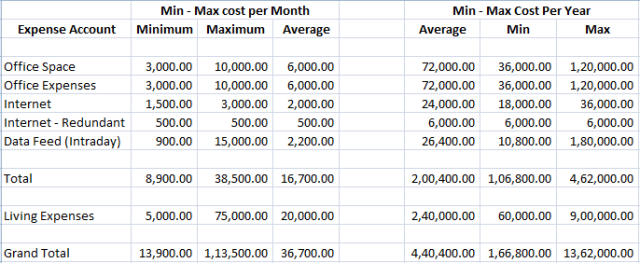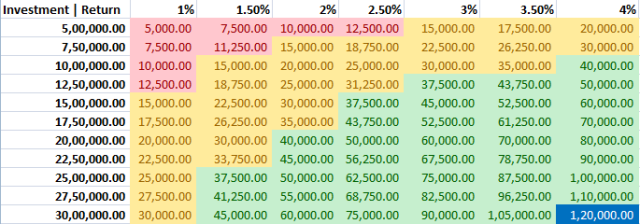When one starts any business, one has a pretty clear idea as to what would be the cost of starting the business. This may go from a few thousands (if you are starting a web based company) to a few crores (say to get a start in the construction business). But when it comes to trading, there is not much of clarity on what capital is required. This post is a attempt to calculate what you will need if you want to get into the business of trading for a living.
The biggest negative of trading for a living is the fact that the number of failures are humongous in number. I have been in the Industry for nearly 17 years now and I do not know of a single trader who was active when I started off and is still active as a trader now. Of course, there will always be folks who have been active for even more a period of time, but the numbers will be pretty small in nature.
One of the key reason why many a trader cannot sustain this venture is due to lack of a viable strategy. It does not matter how big a capital you start with, if you are chasing the wrong end of the stick, you will end up suffering total capital loss.
A second reason for many a trader to be unable to sustain this business is due to them starting with insufficient capital and then hoping to make a living of it. Markets are not a cow that will provide milk every day or a tenant who shall provide the landlord with a monthly income. Even the best of traders go without having a income (or even worse, having a loss) for months together.
Stress for the trader is guaranteed regardless of the methodology he follows if he has a payment to make and markets are not providing him with the moolah. Many a advise I have heard is to keep 3 years of expenses in a separate account so that you are not troubled by the lack of ability to buy milk the next day because you are having a streak of loses and cannot afford to withdraw capital at this juncture.
I constantly keep meeting traders and the one thing that is constant among many is that they are very well capitalized. This with a decent strategy assures that one will be able to survive the thrills and spills that accompany a traders life.
So, what would be the ideal capital for a trader?
Many traders have asked me this question, What shall be my Seed capital for trading. Shall this be 50K , 1 Lakh, 10 Lakh etc. Well as a trader you need to take informed decisions before you commit your capital to Mr. market.
I like to encourage traders to think about the relationship between trading account size and
position sizing, and for those traders trading their own accounts to also consider their trading
capital against their personal wealth.
Taking excessive risk in relation to their trading account.
1. If your trading positions are a significant proportion of your trading capital then any given
loss is also a big loss of your trading capital – a big double whammy!
2. If your trading capital is also a large proportion of your personal wealth then you have a
big triple whammy occurring and that is not a pleasant experience for anyone.

Its a well known fact many of traders enter market due to lure of easy money, hearing stories some XYZ made 10 lakhs in matter of few days. As discussed in may of my previous article, Trading is the most difficult job and requires lot of hard work to be a successful profitable trader.
The answer actually is dependent on a lot of factors including the style of trading. For example, capital requirements of a intra-day trader is very small compared to a positional non leveraged trader.
I did a small exercise as to what is the optimal capital requirement for a trader and the results are as shown in the pic underneath.
The above expenses sheet are based on my assumptions on what would be the cost that one needs to account for.
While the costliest data feed would be having a Bloomberg Terminal, I have assumed that not many a trader would actually go for that and instead based it on eSignal. I personally use Global Data Feeds and the amount I pay comes closer to the Average.
So, considering the above expenses, what is the capital requirement if one assumes that the system will over time generate X% / year (not consistently, but on a long enough time frame).
Most simple strategies do not beat the markets and this means that while its nice to be optimistic and think of generating 4 – 5% per month (48 – 60% per annum), in reality you shall find the returns somewhere between 1 – 2% per month (12 – 24%).
Assuming that you are a Average spender, that would mean that you would need a minimum capital of 2 Million to start with. And since we cannot be pulling out money month on month, you would need to store away half a million so that you do not have to worry about your expenses for a year at least. Totaling that up, you will need around 2.5 Million Rupees for one to get started.
The biggest disadvantage for a trader who needs to dip into the capital for expenses (removal even every year) is that he literally misses out on the Eight wonder of the World – Compounding.
Without compounding of capital, there is really very little of wealth generated over time and while you may feel confident that you can continue to do this till the end of your life, it does put a pressure on one to be correct as far as possible.
At the same time, I have first hand witnessed financial destruction and even death of traders who were not able to sustain themselves. As I wrote in my previous post, the probability of survival for a trader (if this is his only source of Income) is pretty low. Just like not everyone can make it to the IIT, so is the ability to earn a living just through trading.
But if you can succeed, there is nothing more satisfying out there. No clients to argue with, no payments overdue, no employees to worry about. Hell, one is truly one’s own boss and driver of his destiny.
Having said this, still there will be a lot of adventurous individuals who will try to dabble in market without having proper knowledge on what they are doing and losing their hard earned money.Hopefully, I can still persuade those people to not risk their hard-earned savings where the odds are severely stacked against them when they trade with scared money. What i mean by Scared money, is that money which if you lose will hinder your current lifestyle and endanger your social life.So lets discuss the same in detail.
1. Never put your entire saving in trading account because if you are new trader and learning to trade their will be time you will blow out entire account in about 3-6 months. Most of traders have experienced this at least once while learning how to trade. If you blow out you account, which is your entire savings, you are done trading!
2. Trading requires a clear and peaceful mind without distraction. Suppose you are trading with your savings which you cannot lose , fear of losing the amount will creep in your mind when you are placing the trade and your mind will be never be at peace. Worrying about making making money every week to pay your bills will likely doom your trading account.
3. Take it for granted you will make bad trading decisions if you are trading with scared money. Stress causes us to make irrational decisions. You will not see things clearly until after the damage has been done. A typically trait under these circumstances is for traders to take quick profits and let their losses run. They don’t want to take a loss, since they can’t afford to lose the money and a couple big losses will seal the fate of your account – right down the drain.
So always remember Trade with Capital you are willing to lose in Capital Markets. If due to bad trading decisions or bad market you bust your account you are not in condition that you cannot get back to feet and enter market again.
Every trader dreams of becoming a millionaire by making intelligent bets off of a small amount of capital. The reality of trading is that it is unlikely to make millions in a short timeframe from trading a small account.If an edge can be found, money can be made in logn run.


